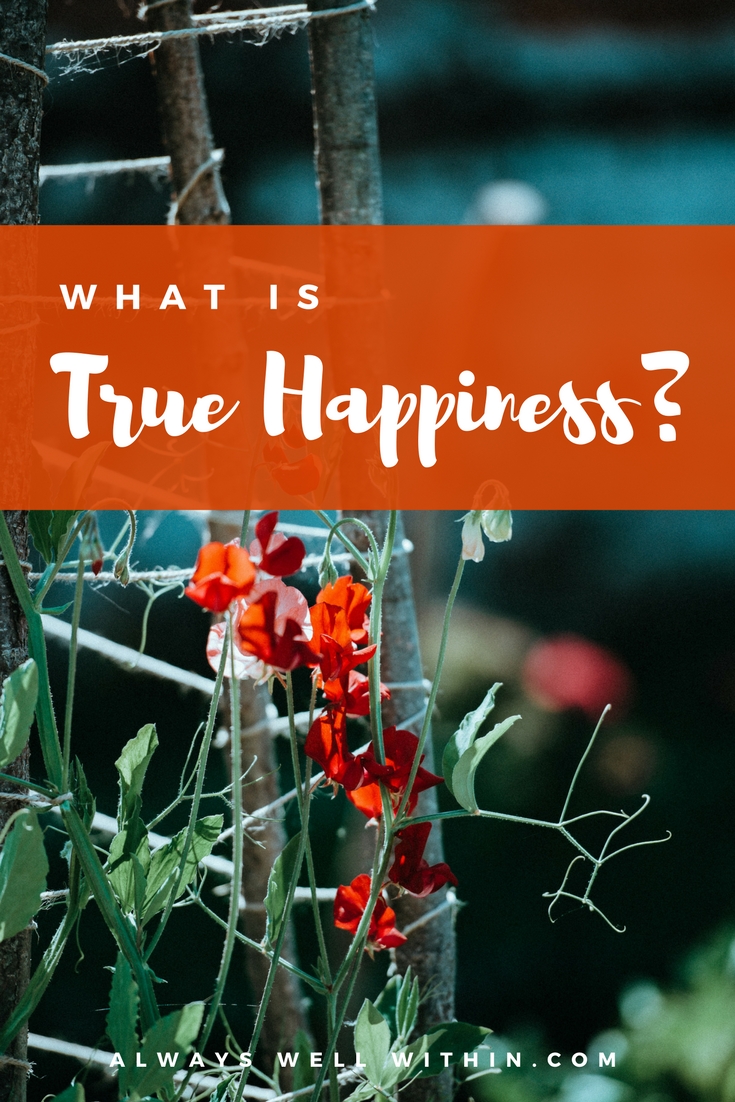What Is True Happiness?
 I sometimes hesitate when I use the word "happiness" on Always Well Within. I don't want to give the wrong impression.
I sometimes hesitate when I use the word "happiness" on Always Well Within. I don't want to give the wrong impression.
"Happiness" can easily be taken to mean a state of constant joy and bliss. Or organizing the externals of your life so that everything runs perfectly. Then there's the idea of focusing on attracting only the positive into your life.
That's not what I mean by happiness at all. So I often use the word "true" or "genuine" to modify happiness and thus hint at a deeper meaning.
What I Mean By "True" Happiness
When we take a moment to look at those around us, we can see that the simple wish to be happy and to avoid suffering is the common denominator that unites us all.
Looking at the world today, we might easily forget that the main purpose of our life - you could call it the heart of being human - is to be happy. All of us share the same wish, and the same right, to seek happiness and avoid suffering. Even following a spiritual path, or the religious life, is a quest for happiness. - Sogyal Rinpoche
But often we confuse happiness with a momentary state of pleasure or passing feeling of joy. We look to experiences or material possession to bring us satisfaction. While this is sometimes the case, the sense of pleasure is never long lasting.
For example, I enjoy my new Kindle tremendously, but I can assure you it's not the source of true happiness. When it runs out of juice, it quickly becomes the source of minor irritation. Likewise, when I'm unable to access the internet to purchase a book. Should it break or wear out - as all material things do - I will feel disgruntled.
The same thing with a sumptuous meal. It might delight for awhile, but it doesn't lead to a deeper happiness. It may even cause indigestion.
Let's not even talk about relationships, which are typically fraught with ups and downs, and are, by their very nature, impermanent.
According to the Oxford Dictionary of English "happy" means feeling or showing pleasure or contentment.
We can immediately eliminate the word "pleasure" from the definition of true happiness. As we have seen, pleasure can never bring a long-lasting sense of happiness and it often brings suffering in its wake.
The word "contentment" contains some of the same meanings as happiness. However, it's also defined as a sense of "ease."
Take a moment to think of someone you know who exudes contentment.
- Don't they seem unruffled by the winds of life?
- Don't they seem to have an inner strength of being?
- A simple wisdom that carries them through all the chaos and drama of life?
This comes far closer to what I mean by true happiness. It's not a momentary feeling of joy, but a perspective and a way of being.
Two Approaches to True Happiness
Setting aside the material, happiness can come about in two ways.
1. On an ordinary level, there are many ways we can train our mind in happiness. For example, we can choose loving thoughts, words, and actions. The more we cultivate love, compassion, joy and impartiality, the more we will become a vibrant source of happiness for others. And for ourselves too.
2. On a profound level, when we are in touch with our true nature - our innermost essence - joy naturally arises. We don't have to do anything in particular to create it. It just flows up when we abide in our natural mind. Other emotions may arise like sadness, anger, worry, or fear, but they won't necessarily stick if we become accustomed to simply resting in the clear and open space of our original mind.
So, where do we find this lasting happiness? In the realization of the ultimate nature of ourselves. Everything is here within us. The truth is within us. Happiness is within us. True happiness and peace of mind cannot be found in anything external; it can only be found within. - Sogyal Rinpoche
These two approaches to cultivating happiness are interconnected. Actively engaging in positive thoughts, words, and deeds brings us closer to our true nature. When we are in touch with our true nature, these positive qualities spontaneously manifest.
Most of us are not even aware of our innermost essence.
We spend all our time embroiled in our thoughts and emotions. We think thoughts and emotions are the real self. But thoughts and emotions are simply like clouds passing by in the open, clear space of our original mind. Sometimes the clouds are white and puffy. Sometimes they are stormy. But they are never permanent, nor are they our true essence. All our suffering comes from confusing the clouds for the sky and holding on to them ever so tightly.
When the mind goes beyond the thought of ‘the me,’ the experiencer, the observer, the thinker, then there is a possibility of a happiness that is incorruptible. – Jiddu Krishnamurti
Can you imagine an incorruptible happiness? Now that's closer to my meaning when I speak of true happiness.
How Do We Find True Happiness?
These days, so many people are wondering how to find happiness. Yet the path to happiness is a simple one.  Follow these steps to a more lasting happiness:
Follow these steps to a more lasting happiness:
- Eliminate negative attitudes, actions, and words. All the ones that cause suffering for self and others.
- Adopt positive attitudes, actions, and words. All the ones that cause happiness for self and others.
- Reconnect with your true nature - the wellspring of happiness, inner peace, compassion, and wisdom - through the practice of meditation. Learn more about meditation: 21 Meditation Tips You Need to Know As a Beginner.
It's not about "good" or "bad" in a moralistic sense. It's about looking deeply to see which actions actually bring true happiness on the long run, and which ones are bound to bring suffering upon suffering.
Simple doesn't mean easy, however.
We have a lifetime of bad habits to counter. There's the hyperactive mind to pacify. Or the dull mind that needs to wake up. Happiness requires discipline and effort. But nourished by happiness, discipline becomes joyful and effort becomes spacious and relaxed. It's becomes a self-seeding cycle of ever-growing calm, clarity, and insight.
Dig within. Within is the wellspring of good; and it is always ready to bubble up, if you just dig.” – Marcus Aurelius
Ultimately, we can be free of suffering. There is a path to true happiness and freedom from suffering. Start now by engaging in positive actions and eliminating the negative ones.
Recommended Reading on Meditation and the Nature of Mind
- The Joy of Living, Unlocking the Secret and Science of Happiness by Yongey Mingyur Rinpoche
- Rebel Buddha, On the Road to Freedom by Dzogchen Ponlop Rinpoche
Thank you for your presence, I know your time is precious! Don’t forget to sign up for my e-letter and get access to all the free self-development resources (e-books, mini-guides + worksheets) in the Always Well Within Library. May you be happy, well, and safe – always. With love, Sandra
SaveSave
SaveSave